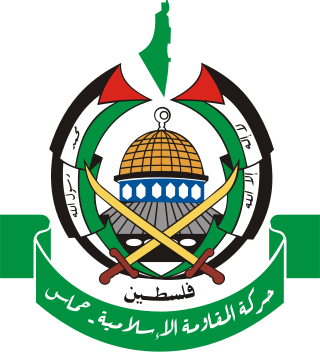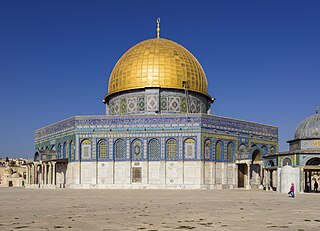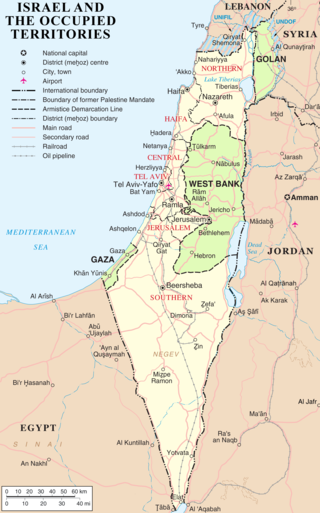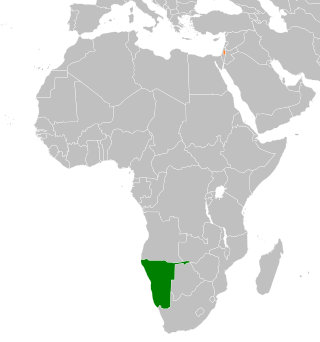Related Research Articles

The Gaza Strip, or simply Gaza, is a polity and the smaller of the two Palestinian territories. On the eastern coast of the Mediterranean Sea, Gaza is bordered by Egypt on the southwest and Israel on the east and north.

Hamas, an acronym of its official name, Harakat al-Muqawama al-Islamiya, is a Palestinian Sunni Islamist political and military movement governing the Israeli-occupied Gaza Strip since 2007.

The Israeli–Palestinian conflict is an ongoing military and political conflict about land and self-determination within the territory of the former Mandatory Palestine. Key aspects of the conflict include the Israeli occupation of the West Bank and Gaza Strip, the status of Jerusalem, Israeli settlements, borders, security, water rights, the permit regime, Palestinian freedom of movement, and the Palestinian right of return.

The history of the State of Palestine describes the creation and evolution of the State of Palestine in the West Bank and Gaza Strip. During the Mandatory period, numerous plans of partition of Palestine were proposed but without the agreement of all parties. In 1947, the United Nations Partition Plan for Palestine was voted for. The leaders of the Jewish Agency for Palestine accepted parts of the plan, while Arab leaders refused it. This triggered the 1947–1949 Palestine war and led, in 1948, to the establishment of the state of Israel on a part of Mandate Palestine as the Mandate came to an end.

Palestine, officially the State of Palestine, is a country of partially international recognition in the southern Levant region of West Asia. It encompasses two disconnected territories — the West Bank and the Gaza Strip, collectively known as the Palestinian territories — within the larger region of Palestine. The country shares its borders with Israel to north, west and south, Jordan to the east and Egypt to the southwest. It has a combined land area of 6,020 square kilometres (2,320 sq mi) while its population exceeds five million people. Its proclaimed capital is Jerusalem while Ramallah serves as its administrative center and Gaza City was its largest city until massive population movements began in 2023 due to the Israeli invaison of the Gaza strip. Arabic is the official language. The majority of Palestinians practice Islam while Christianity also has a significant presence.

Israel has occupied the Palestinian territories and the Golan Heights since the Six-Day War of 1967. It previously occupied the Sinai Peninsula and southern Lebanon as well. Prior to Israel's victory in the Six-Day War, occupation of the Palestinian territories was split between Egypt and Jordan, with the former having occupied the Gaza Strip and the latter having annexed the West Bank; the Sinai Peninsula and the Golan Heights were under the sovereignty of Egypt and Syria, respectively. The first conjoined usage of the terms "occupied" and "territories" with regard to Israel was in United Nations Security Council Resolution 242, which was drafted in the aftermath of the Six-Day War and called for: "the establishment of a just and lasting peace in the Middle East" to be achieved by "the application of both the following principles: ... Withdrawal of Israeli armed forces from territories occupied in the recent conflict ... Termination of all claims or states of belligerency and respect for and acknowledgment of the sovereignty, territorial integrity and political independence of every State in the area and their right to live in peace within secure and recognized boundaries free from threats or acts of force."
The status of territories captured by Israel is the status of the Gaza Strip, the West Bank, the Golan Heights, and the Sinai Peninsula, all of which were captured by Israel during the 1967 Six-Day War.

The Prisoners' Document, officially the National Conciliation Document of the Prisoners was written in May 2006 by Palestinian prisoners, who were being held in an Israeli jail. The five prisoners who took part in writing the Document were respectively affiliated with Fatah, Hamas, Islamic Jihad, the Popular Front for the Liberation of Palestine (PFLP), and the Democratic Front for the Liberation of Palestine (DFLP).

Leila Farsakh is a Palestinian political economist who was born in Jordan and is a Professor of Political Science at University of Massachusetts Boston. Her area of expertise is Middle East Politics, Comparative Politics, and the Politics of the Arab-Israeli Conflict. Farsakh holds a MPhil from the University of Cambridge, UK (1990) and a PhD from the University of London (2003).
Issues relating to the State of Palestine and aspects of the Israeli–Palestinian conflict occupy continuous debates, resolutions, and resources at the United Nations. Since its founding in 1948, the United Nations Security Council, as of January 2010, has adopted 79 resolutions directly related to the Arab–Israeli conflict.
Sara M. Roy is an American political economist and scholar. She is a Senior Research Scholar at the Center for Middle Eastern Studies at Harvard University.

The Covenant of the Islamic Resistance Movement, referred to as the Hamas Covenant or Hamas Charter, was issued by Hamas on 18 August 1988 and outlines the organization's founding identity, positions, and aims. In 2017, Hamas unveiled a revised charter, without explicitly revoking the 1988 charter.

Reactions to the 2014 Gaza War came from around the world.
The legality of the Israeli occupation of Palestine, which has continued since 1967 and is the longest military occupation in modern history, is a subject that has received much less attention than violations of international humanitarian law (IHL) and international human rights law (IHRL) that have occurred during the occupation. Multiple United Nations General Assembly resolutions have described the continuing occupation as illegal. The general thrust of international law scholarship addressing this question has concluded that, regardless of whether it was initially legal, the occupation has become illegal over time. Reasons cited for its illegality include use of force for impermissible purposes such as annexation, violation of the Palestinian right to self-determination, that the occupation itself is an illegal regime "of alien subjugation, domination and exploitation", or some combination of these factors. Eyal Benvenisti suggested that refusal by an occupier to engage in good faith with efforts to reach a peaceful solution should not only be considered illegal but as outright annexation. International law scholar Ralph Wilde states that "The common way of understanding the extended duration of the occupation... is a prolonged violation of international law". However, Israel denies that it is occupying Palestine and maintains that its presence is legal.

The right to resist is a human right, although its scope and content are controversial. The right to resist, depending on how it is defined, can take the form of civil disobedience or armed resistance against a tyrannical government or foreign occupation; whether it also extends to non-tyrannical governments is disputed. Although Hersch Lauterpacht, one of the most distinguished jurists, called the right to resist the supreme human right, this right's position in international human rights law is tenuous and rarely discussed. Forty-two countries explicitly recognize a constitutional right to resist, as does the African Charter on Human and Peoples' Rights.

Legal Consequences arising from the Policies and Practices of Israel in the Occupied Palestinian Territory, including East Jerusalem is a proceeding in the International Court of Justice (ICJ), stemming from a resolution adopted by the United Nations General Assembly (UNGA) in December 2022, requesting the Court to render an advisory opinion. In January 2023, the ICJ acknowledged a request from the UNGA for an advisory opinion on the legal consequences arising from the policies and practices of Israel in the occupied Palestinian territory, including East Jerusalem. Public hearings opened on Monday, 19 February 2024 in The Hague with 52 states and three international organizations participating.

Francesca P. Albanese is an Italian international lawyer and academic. On 1 May 2022, she was appointed United Nations Special Rapporteur on the occupied Palestinian territories for a three-year term. She is the first woman to hold the position.
On 7 October 2023, a large escalation of the Gaza–Israel conflict began with a coordinated offensive by multiple Palestinian militant groups against Israel. A number of countries, including many of Israel's Western allies, such as the United States and a number of European countries, condemned the attacks by Hamas, expressed solidarity for Israel and stated that Israel has a right to defend itself from armed attacks, while countries of the Muslim world have expressed support for the Palestinians, blaming the Israeli occupation of the Palestinian territories as being the root cause for the escalation of violence. The events prompted several world leaders to announce their intention to visit Israel, including US President Joe Biden, French President Emmanuel Macron, German Chancellor Olaf Scholz, and British Prime Minister Rishi Sunak.
In May 2017 Palestinian political and military organization Hamas unveiled A Document of General Principles and Policies, also referred to as the new or revised Hamas charter. It accepted the idea of a Palestinian state within the 1967 borders, on the condition that also the Palestinian refugees were allowed to return to their homes, if it is clear this is the consensus of the Palestinians ; but at the same time this document strove for the "complete liberation of Palestine, from the river to the sea", and did not explicitly recognize Israel. The new charter holds that armed resistance against an occupying power is justified under international law.

Namibia–Palestine relations refer to foreign relations between Namibia and the State of Palestine.
References
- Falk, Richard (2002). "Azmi Bishara, the Right of Resistance, and the Palestinian Ordeal". Journal of Palestine Studies. 31 (2): 19–33. doi:10.1525/jps.2002.31.2.19.
- Francis, Sahar (2014). "Status of Palestinian Prisoners in International Humanitarian Law". Journal of Palestine Studies. 43 (4): 39–48. doi:10.1525/jps.2014.43.4.39.
- Jamshidi, Maryam (2024). "Genocide and Resistance in Palestine under Law's Shadow". Journal of Genocide Research . doi: 10.1080/14623528.2024.2348377 .
- Moughrabi, Fouad (1992). "Israeli Control and Palestinian Resistance". Social Justice. 19 (3 (49)): 46–62. ISSN 1043-1578. JSTOR 29766693.
- Quigley, John (2005). The Case for Palestine: An International Law Perspective. Duke University Press. ISBN 9780822386766.
- Sabel, Robbie (2022). International law and the Arab-Israeli conflict. Cambridge, United Kingdom ; New York, NY: Cambridge University Press. ISBN 9781108762670.